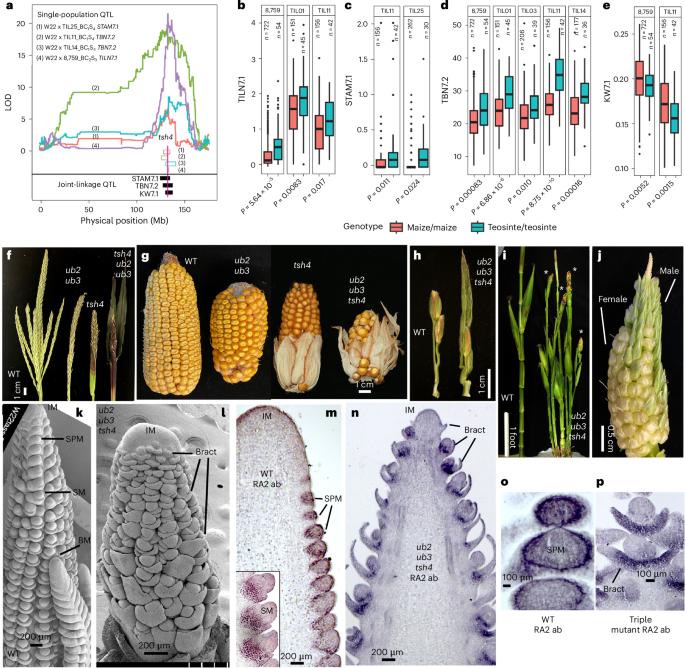A regulatory network controlling developmental boundaries and meristem fates contributed to maize domestication
IF 31.7
1区 生物学
Q1 GENETICS & HEREDITY
引用次数: 0
Abstract
During domestication, early farmers selected different vegetative and reproductive traits, but identifying the causative loci has been hampered by their epistasis and functional redundancy. Using chromatin immunoprecipitation sequencing combined with genome-wide association analysis, we uncovered a developmental regulator that controls both types of trait while acting upstream of multiple domestication loci. tasselsheath4 (tsh4) is a new maize domestication gene that establishes developmental boundaries and specifies meristem fates despite not being expressed within them. TSH4 accomplishes this by using a double-negative feedback loop that targets and represses the very same microRNAs that negatively regulate it. TSH4 functions redundantly with a pair of homologs to positively regulate a suite of domestication loci while specifying the meristem that doubled seed yield in modern maize. TSH4 has a critical role in yield gain and helped generate ideal crop plant architecture, thus explaining why it was a major domestication target. Maize transcription factor TASSELSHEATH4 establishes the leaf versus meristem cell boundary and vegetative versus floral axillary meristem fates as part of a domestication gene network.


控制发育边界和分生组织命运的调控网络促进了玉米的驯化
在驯化过程中,早期农民选择了不同的无性系和生殖性状,但由于这些性状的外显性和功能冗余性,确定致病位点的工作一直受到阻碍。Tasselsheath4(tsh4)是一个新的玉米驯化基因,它能建立发育界限并指定分生组织的命运,尽管它并不在分生组织中表达。TSH4 通过双重负反馈回路来实现这一目标,该回路靶向并抑制对其进行负调控的相同 microRNA。TSH4 与一对同源物具有冗余功能,可以正向调节一系列驯化基因座,同时指定分生组织,使现代玉米的种子产量翻倍。TSH4 在增产中起着关键作用,有助于产生理想的作物植株结构,从而解释了为什么它是主要的驯化目标。
本文章由计算机程序翻译,如有差异,请以英文原文为准。
求助全文
约1分钟内获得全文
求助全文
来源期刊

Nature genetics
生物-遗传学
CiteScore
43.00
自引率
2.60%
发文量
241
审稿时长
3 months
期刊介绍:
Nature Genetics publishes the very highest quality research in genetics. It encompasses genetic and functional genomic studies on human and plant traits and on other model organisms. Current emphasis is on the genetic basis for common and complex diseases and on the functional mechanism, architecture and evolution of gene networks, studied by experimental perturbation.
Integrative genetic topics comprise, but are not limited to:
-Genes in the pathology of human disease
-Molecular analysis of simple and complex genetic traits
-Cancer genetics
-Agricultural genomics
-Developmental genetics
-Regulatory variation in gene expression
-Strategies and technologies for extracting function from genomic data
-Pharmacological genomics
-Genome evolution
 求助内容:
求助内容: 应助结果提醒方式:
应助结果提醒方式:


